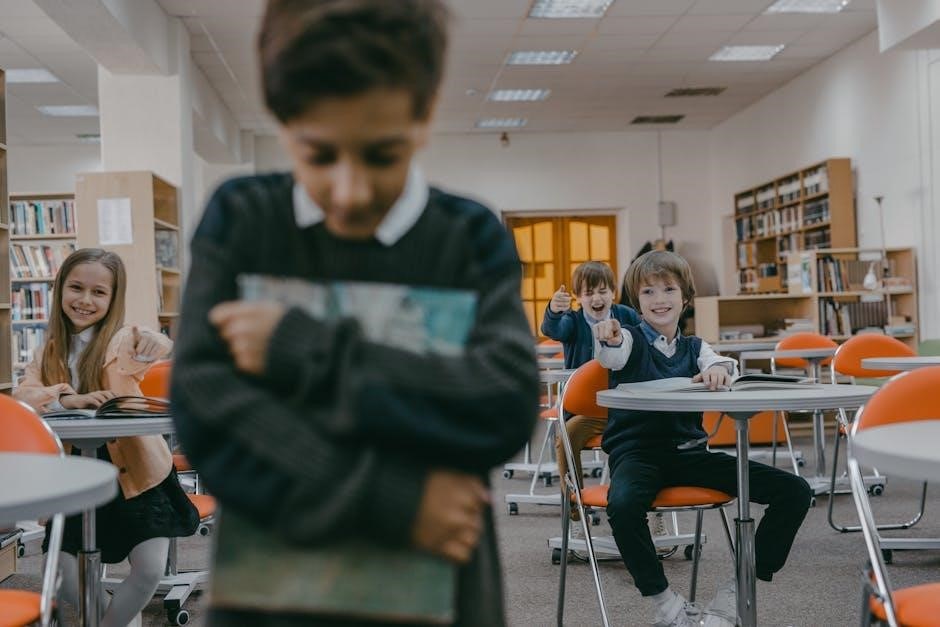Social Emotional Learning (SEL) is essential for fostering emotional intelligence, empathy, and self-awareness in students. Printable worksheets offer practical exercises to help children develop these skills in engaging ways, both in school and at home.
What is Social Emotional Learning (SEL)?
Social Emotional Learning (SEL) is a process that helps individuals develop essential life skills, such as self-awareness, self-management, social awareness, relationship skills, and responsible decision-making. These skills enable students to understand and manage their emotions, set goals, and build positive relationships with others. SEL is not just about academic success but also about fostering emotional intelligence, empathy, and resilience. Printable worksheets and activities are widely used to teach these concepts in a structured and engaging manner. They provide practical exercises that help students reflect on their feelings, behaviors, and interactions with others. By incorporating SEL into education, educators aim to create a supportive environment where students can thrive socially, emotionally, and academically. The use of printable resources makes it easier for teachers and parents to implement SEL activities consistently.
Why is SEL Important for Students?
Social Emotional Learning (SEL) is crucial for students as it helps them develop essential life skills that contribute to personal growth and success. By fostering self-awareness, self-management, and social skills, SEL equips students to navigate challenges confidently. It also enhances their ability to build positive relationships, resolve conflicts, and empathize with others. These skills are vital for academic achievement, as they improve focus, motivation, and overall well-being. Additionally, SEL supports mental health by teaching students to recognize and manage their emotions effectively. Printable worksheets and activities make it easier for educators and parents to integrate SEL into daily routines, ensuring students develop the resilience and interpersonal skills needed for lifelong success. Investing in SEL fosters a supportive environment where students can thrive emotionally, socially, and academically.

Types of Printable SEL Worksheets
Printable SEL worksheets include self-awareness, emotional recognition, social skills, self-regulation, and empathy-building activities. These tools help students develop essential life skills through structured exercises and engaging tasks.
Self-Awareness Worksheets
Self-awareness worksheets help students identify and understand their emotions, values, and strengths. These exercises often include reflection prompts, feeling charts, and goal-setting activities. They encourage kids to recognize how their thoughts and feelings impact behaviors, fostering personal growth and confidence. Many worksheets are designed for different age groups, ensuring relevance and effectiveness. Teachers and parents can use these tools to guide children in developing a positive self-image and emotional intelligence, which are crucial for social interactions and academic success. By engaging with these activities, students gain insights into their personalities and develop coping strategies, laying a strong foundation for lifelong emotional health.
Emotional Recognition and Management Activities
Emotional recognition and management activities are designed to help students identify, understand, and regulate their emotions. These exercises often include mood trackers, emotion charades, and scenario-based worksheets. Children learn to recognize emotional cues in themselves and others, fostering empathy and self-regulation. Activities like “Feelings Faces” involve matching emotions with expressions, while “Emotion Sorting Games” categorize feelings as positive, negative, or neutral. Worksheets may ask students to describe situations that trigger certain emotions and strategies to manage them. These tools empower students to navigate emotional challenges confidently, improving their mental well-being and relationships. By practicing these skills, children develop healthier ways to express and cope with emotions, preparing them for real-life situations. These activities are engaging and adaptable for various age groups, making them a valuable resource for educators and parents.

Social Skills Development Exercises
Social skills development exercises are crucial for helping students build positive relationships and interact effectively with others. Printable worksheets often include role-playing scenarios, group activities, and reflection prompts to enhance communication, cooperation, and conflict resolution. Activities like “Conversation Starters” encourage students to initiate discussions, while “Teamwork Challenges” foster collaboration. Worksheets may also focus on understanding social cues, active listening, and empathy. For example, exercises such as “How Would You Feel?” help students consider others’ perspectives. These tools are designed to be engaging and adaptable for different age groups, ensuring students develop essential interpersonal skills. By practicing these exercises, students gain confidence in navigating social situations, leading to stronger, more positive relationships in and out of the classroom.
Self-Regulation and Self-Control Practices
Self-regulation and self-control practices are essential for helping students manage their emotions, behaviors, and thoughts. Printable worksheets often include exercises like emotion rating scales, thought bubble activities, and “Stop, Think, Act” scenarios to teach impulse control. These tools help students identify triggers, pause before reacting, and choose appropriate responses. Worksheets may also incorporate mindfulness exercises, breathing techniques, and problem-solving prompts to enhance emotional resilience. For example, activities such as “Feelings Check-In” encourage students to recognize and label their emotions, while “Self-Control Scenarios” provide real-life situations for practice. These exercises empower students to develop self-awareness, reduce impulsive behaviors, and build resilience. By practicing self-regulation, students can better navigate challenges and maintain focus in academic and social settings, leading to improved overall well-being and success.
Empathy and Relationship-Building Activities
Empathy and relationship-building activities are designed to help students understand and connect with others’ emotions and perspectives. Printable worksheets often include exercises like “Perspective-Taking Scenarios,” where students imagine how someone else might feel in a given situation. Other activities, such as “Feelings Charades” or “Empathy Mapping,” encourage students to recognize and express emotions through role-playing or visual representation. Worksheets may also incorporate collaborative tasks, such as group discussions or “Kindness Chains,” to foster positive interactions and teamwork. These exercises help students develop active listening skills, build trust, and strengthen peer relationships. By practicing empathy, students learn to navigate social dynamics more effectively, leading to a more inclusive and supportive classroom environment. These activities not only enhance emotional intelligence but also promote a culture of kindness and understanding among students.
Popular Sources for Free Printable SEL Worksheets
Websites like Teachers Pay Teachers and Centervention offer free printable SEL worksheets, providing various activities to support emotional intelligence and social skills development for educators and parents.
Websites Offering Free SEL Resources
Several websites provide free printable SEL resources, making it easy for educators and parents to access high-quality materials. Teachers Pay Teachers (TPT) is a popular platform offering a wide range of free and paid SEL worksheets, activities, and lesson plans. Centervention is another excellent source, providing downloadable worksheets focused on self-awareness, social skills, and emotional regulation. Additionally, websites like healthsmartva.org and Scholastic offer free printable SEL activities designed for various grade levels. These resources often include no-prep worksheets, making them ideal for last-minute lessons or individual student support. Many websites also cater to specific age groups, such as preschoolers or high school students, ensuring the materials are age-appropriate and engaging. By leveraging these online resources, educators can easily incorporate SEL into daily routines and support students’ emotional and social development.
How to Search for Age-Appropriate Worksheets
To find age-appropriate SEL worksheets, start by using specific search terms like “printable SEL activities for elementary” or “social emotional learning worksheets for high school.” Websites often categorize resources by grade level, so use filters or navigation menus to narrow your search. Look for descriptions that mention the target age group or grade range, ensuring the content aligns with the developmental stage of your students. Many resources, such as those on Teachers Pay Teachers, include detailed descriptions or previews, allowing you to assess suitability before downloading. Additionally, some websites offer bundles tailored to specific age groups, such as preschool or middle school. Always review the content to ensure it matches the needs and maturity level of your students, and consider recommendations from educators or reviews to guide your selection.

How to Use SEL Worksheets Effectively
Integrate worksheets into daily routines, encouraging reflection and discussion. Pair with hands-on activities to deepen understanding and promote practical application of social emotional skills in real-life situations;
Integrating Worksheets into Daily Routines
Incorporating printable SEL worksheets into daily routines can enhance learning consistency. Start with morning check-ins using emotions charts or reflection prompts. Assign worksheets as homework or warm-up activities to reinforce concepts. Teachers can keep no-prep worksheets on hand for quick lessons or individual student support. Pairing SEL activities with hands-on exercises, like role-playing or group discussions, fosters deeper understanding. Encourage families to access these resources at home, ensuring continuous skill development. By integrating SEL worksheets into daily schedules, educators create a structured yet flexible environment for students to grow emotionally and socially. This approach bridges classroom and home learning, promoting holistic development.

Encouraging Student Reflection and Discussion
Reflection and discussion are vital components of effective SEL practices. Printable worksheets can serve as powerful tools to prompt students to think deeply about their emotions, behaviors, and interactions. Activities such as journaling, role-playing, and group discussions encourage students to express their feelings and perspectives. Worksheets that ask students to rank statements about their attitudes or emotions help them identify their personal tendencies. For instance, exercises like “Whats Their Attitude?” or “Introvert or Extrovert?” allow students to reflect on their social styles and how they impact relationships. These exercises also create opportunities for meaningful conversations, fostering empathy and collaboration. By incorporating reflection and discussion into SEL routines, educators help students develop self-awareness and interpersonal skills, preparing them to navigate real-world challenges with confidence and understanding.
Supplementing Worksheets with Hands-On Activities
While worksheets are valuable, hands-on activities can deepen students’ understanding of SEL concepts. These activities engage students in real-world applications of emotional intelligence, fostering practical skills. For instance, role-playing exercises allow students to practice social interactions, empathy, and conflict resolution in a safe environment. Group discussions and collaborative projects encourage teamwork and communication, while art-based activities, like creating a “Kindness Chain,” help students visually represent positive behaviors. Outdoor activities, such as community service or team-building games, further reinforce SEL principles by connecting learning to real-life experiences. By combining worksheets with hands-on learning, educators create a well-rounded approach that enhances retention and application of SEL skills, preparing students to navigate social and emotional challenges with confidence and resilience.
